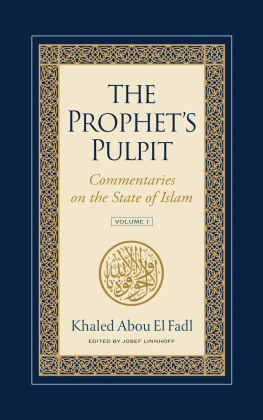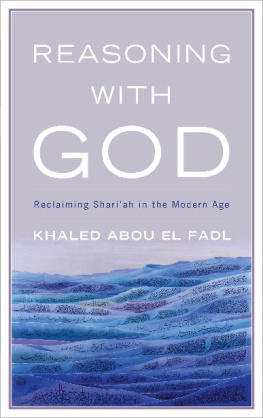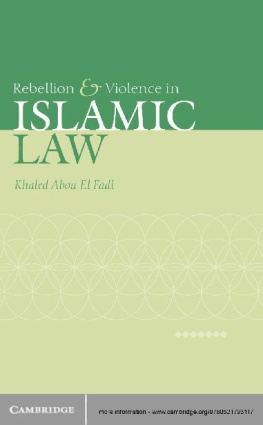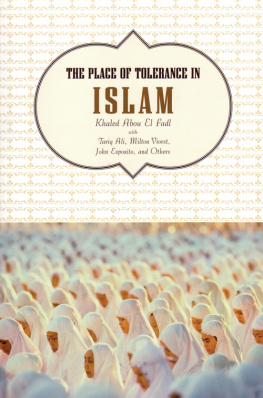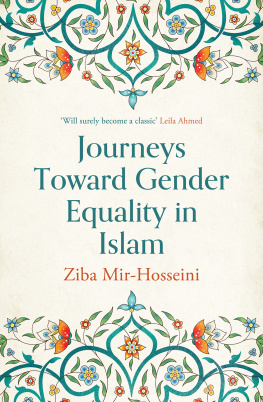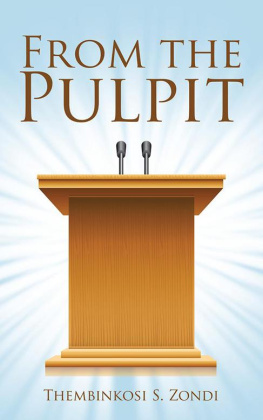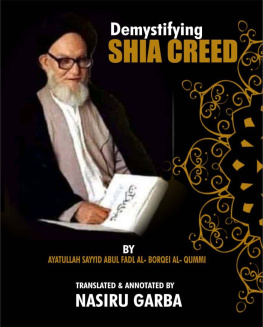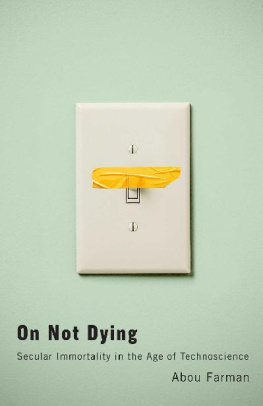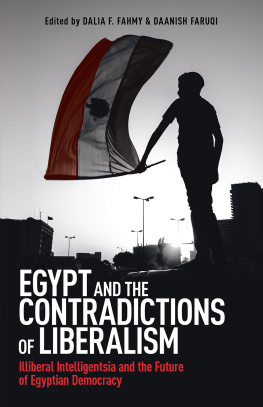Khaled Abou El Fadl - The Prophets Pulpit: Commentaries on the State of Islam
Here you can read online Khaled Abou El Fadl - The Prophets Pulpit: Commentaries on the State of Islam full text of the book (entire story) in english for free. Download pdf and epub, get meaning, cover and reviews about this ebook. year: 2022, publisher: Usuli Press, genre: Religion. Description of the work, (preface) as well as reviews are available. Best literature library LitArk.com created for fans of good reading and offers a wide selection of genres:
Romance novel
Science fiction
Adventure
Detective
Science
History
Home and family
Prose
Art
Politics
Computer
Non-fiction
Religion
Business
Children
Humor
Choose a favorite category and find really read worthwhile books. Enjoy immersion in the world of imagination, feel the emotions of the characters or learn something new for yourself, make an fascinating discovery.
- Book:The Prophets Pulpit: Commentaries on the State of Islam
- Author:
- Publisher:Usuli Press
- Genre:
- Year:2022
- Rating:5 / 5
- Favourites:Add to favourites
- Your mark:
- 100
- 1
- 2
- 3
- 4
- 5
The Prophets Pulpit: Commentaries on the State of Islam: summary, description and annotation
We offer to read an annotation, description, summary or preface (depends on what the author of the book "The Prophets Pulpit: Commentaries on the State of Islam" wrote himself). If you haven't found the necessary information about the book — write in the comments, we will try to find it.
The Prophets Pulpit: Commentaries on the State of Islam — read online for free the complete book (whole text) full work
Below is the text of the book, divided by pages. System saving the place of the last page read, allows you to conveniently read the book "The Prophets Pulpit: Commentaries on the State of Islam" online for free, without having to search again every time where you left off. Put a bookmark, and you can go to the page where you finished reading at any time.
Font size:
Interval:
Bookmark:

Copyrighted Material
The Prophets Pulpit: Commentaries on the State of Islam, Volume I
Copyright 2022 by Usuli Press. All Rights Reserved.
No part of this publication may be reproduced, stored in a retrieval system or transmitted, in any form or by any meanselectronic, mechanical, photocopying, recording or otherwisewithout prior written permission from the publisher, except for the inclusion of brief quotations in a review.
For information about this title or to order other books and/or electronic media, contact the publisher:
Usuli Press
715 Shawan Falls Drive, Suite 662
Dublin, OH 43017
www.usulipress.com
Email:
Usuli Press is an imprint of The Institute for Advanced Usuli Studies (The Usuli Institute).
www.usuli.org
Library of Congress Control Number (LCCN): 2022900222
ISBNs:
Hardcover Case Laminate: 978-1-957063-00-3
Hardcover Dust Jacket: 978-1-957063-04-1
Paperback: 978-1-957063-02-7
eBook: 978-1-957063-01-0
Library Bound: 978-1-957063-03-4
Cover design by Robin Locke Monda
Interior design by 1106 Design
The Arabic calligraphy on the front cover can be translated as There is no strength or power except with God.
This book is dedicated to Muslims around the world suffering under injustice and oppression...
C ONTENTS

P REFACE

I first encountered Professor Khaled Abou El Fadls writings as a non-Muslim undergraduate student in theology. The encounter sparked an initial interest in Islamic Studies, an interest that soon grew into a passion and led to further studies, eventually culminating in a PhD degree. The same passion also led to my conversion to Islam in 2015. Yet conversion to Islam is not easy. It is much more than a change in belief or ritual; it is a major rethinking of how you see the world and everything in it. A convert enters a strange liminal spacea Muslim among friends and family, a convert among Muslims. The converts new sense of faith is also delicate and fragile; it needs to be nurtured. In my own case, while I loved many aspects of my new-found faith, perhaps the worst thing about my new life was listening to the Friday khutbah (sermon). In those opening weeks and months, I remember waiting to hear to a sermon that actually addressed the real ethical issues plaguing Muslim communities. Rather than address those very real problems, most sermons were entirely divorced from reality. Most sermons were speaking a different language than the congregationfiguratively, but sometimes literallyand discussing the same select topics ad nauseam, avoiding any talk that was relevant, ethical, or thoughtful. A weekly event meant to inspire and elevate typically achieved the opposite. Was it just me? Were my expectations unrealistic? Was I attending the wrong mosque? Slowly but surely, the realization dawned: this problem was endemic. Initial enthusiasm soon gave way to confusion, bitterness, and, perhaps worst of all, apathy.
It was against this backdrop that I reconnected with the work of Professor Abou El Fadl, more specifically through the work of the then newly-established Institute for Advanced Usuli Studies (The Usuli Institute). I was by this time well acquainted with the Professors writings. I knew him as a highly distinguished name in academia, widely respected as a classically trained jurist with expertise in both the Islamic and Western legal traditions. Several of his works had become classics in the field. I also knew of Professor Abou El Fadls accomplishments in the field of human rights, including his being the first Muslim board member of Human Rights Watch and his receiving the University of Oslos Human Rights Award in 2007. But what spoke to me personally through his halaqas and khutbahs at The Usuli Institute was his honesty, candor, and awareness of the real challenges facing Muslims. The Professor spoke with a frankness that I had yet to hear in any Muslim space. His insights were rich with knowledge, experience, and, perhaps most disarmingly of all, common sense. As a jaded convert, it was exactly what I was looking for. It was like cold water to a parched soul.
I reached out to The Usuli Institute and connected with Grace Song, the Executive Director. After several conversations, Grace asked me to take the lead on collecting, editing, and publishing a collection of Professor Abou El Fadls khutbahs. These khutbahs had already impacted me. And the more that I read, collected, and edited the volume, the more I was reminded of why I became Muslim. The work rekindled my own love for the faith.
But I was driven by something else. What if these khutbahs were more widely available? What if this way of thinking and talking about Islam reached a larger audience? What if more jumuas and khutbahs were like this? I knew that my own experiences and frustrations were not unique. I knew that so many Muslims, young and old, were looking for something more, something fresh, something to remind them of the power and beauty of their faith. So many were searching for the Islam that is expressed in this volume: an Islam of ethics, justice, and beauty; an Islam that speaks to both head and heart, rooted in the past but fully engaged with the present; an Islam that sees reason and enquiry not as enemies of faith, but as a means to faith; an Islam, quite simply, of meaning and relevance to the world. What had strengthened my own faith, I realized, could do the same for others.
There is a beautiful paradox underpinning Professor Abou El Fadls thought. It is clearly on display in this volume. On the one hand, Professor Abou El Fadl calls for an Islam steeped in learning, knowledge, and erudition. Behind every khutbah stands a vast amount of reading and a mastery of the relevant discipline, whether Islamic history, theology, jurisprudence, U.S. constitutional or human rights law, among others. It is the requirement of every scholar or jurist, he states, to master the systems of knowledge of the age. Yet the current volume also calls us toward an Islam that is natural and intuitive. These khutbahs are not academic treatises aimed at a scholarly elite. Rather, they seek to remind all Muslims of some of the most basic and foundational truths of the faith. If something is unjust, ugly, or oppressive, for example, then it cannot be Islamic; Islam must above all be reasonable, make sense, and not sit heavy on the chest; Islam is more than just the performance of ritual or the minutia and mechanics of law.
It should be added to this that Professor Abou El Fadl is no armchair scholar detached from the harsh realities of life. Quite the opposite. His ideas were formed in the heat of test, trial, and suffering. There is a price to pay for Muslim scholars today who speak truth to power. Professor Abou El Fadls stance has come at a huge personal cost. He has in the past been arrested and tortured by the Egyptian security services. He has survived several assassination attempts. To this day, he cannot enter Egypt or Saudi Arabia for fear of his personal safety. He suffers many debilitating health issues, some a direct result of these ordeals. That Professor Abou El Fadl continues to speak from the pulpit is itself a display of his intellectual courage. The act alone sets a moral example. When he calls for the imperative of justice or condemns the evils of despotism, then, these are not mere abstractions. He is speaking from personal and painful experience. Readers are encouraged to keep this background in mind.
Font size:
Interval:
Bookmark:
Similar books «The Prophets Pulpit: Commentaries on the State of Islam»
Look at similar books to The Prophets Pulpit: Commentaries on the State of Islam. We have selected literature similar in name and meaning in the hope of providing readers with more options to find new, interesting, not yet read works.
Discussion, reviews of the book The Prophets Pulpit: Commentaries on the State of Islam and just readers' own opinions. Leave your comments, write what you think about the work, its meaning or the main characters. Specify what exactly you liked and what you didn't like, and why you think so.

